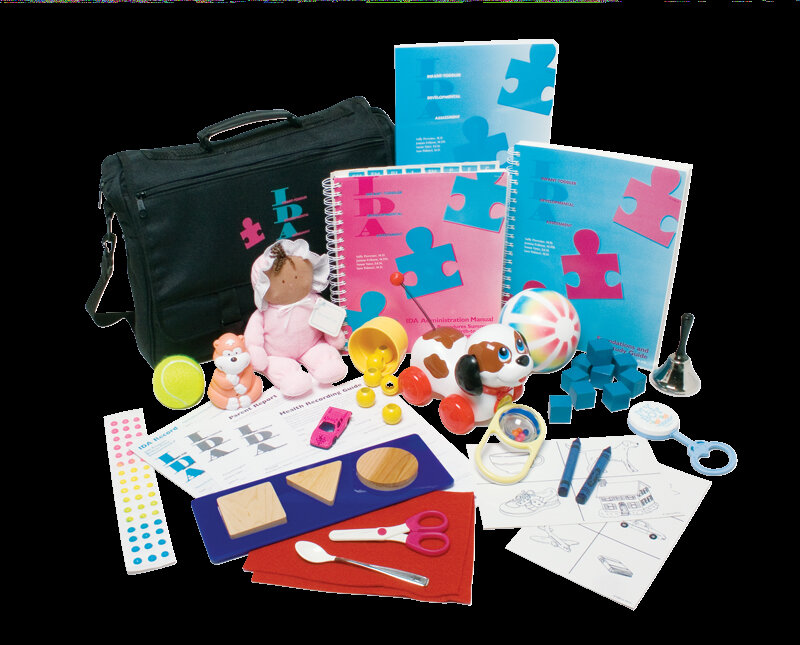Please specify the quantity of product(s).



Infant-Toddler Developmental Assessment–Second Edition (IDA-2)
| Item | Product | Price | QTY |
|---|---|---|---|
| 32107 | Infant Developmental Assessment-2 (IDA-2) Kit | $737.00 | |
| 32107-SP | IDA-2 SPANISH Parent Report Forms, Pk/25 | $59.00 | |
| 32107F | IDA-2 Study Guide | $135.00 | |
| 32107H | IDA-2 Health Record Guides, Pk/25 | $59.00 | |
| 32107M | IDA-2 Manual | $135.00 | |
| 32107P | IDA-2 Parent Report Forms, Pk/25 | $59.00 | |
| 32107R | IDA-2 Record Forms, Pk/25 | $97.00 | |
| 32107K | IDA-2 Manipulatives Kit | $234.00 | |
| 32107-SR | IDA-2 Record Forms-Spanish, Pk/25 | $97.00 |
Updated assessment to identify early developmental issues, using a guided step-by-step process
Sally Provence * Joanna Erickson * Susan Vater * Saro Palmeri * Kyle Pruett * Jennifer Rosinia
- Ages: Birth to 3-6 years
- Time: Varies
- Administration: Individual
The Infant-Toddler Developmental Assessment–Second Edition (IDA-2) is a comprehensive, multidisciplinary, family-centered six-phase process designed to identify children birth to 3 years of age who are developmentally at risk. The IDA-2 includes the Provence Birth-to-Three Developmental Profile, a criterion-referenced measure of development in eight areas: (1) gross motor, (2) fine motor, (3) relationship to inanimate objects, (4) language/communication, (5) self-help, (6) relationship to persons, (7) emotions and feeling states, and (8) coping behavior.
IDA-2’s team-based approach helps determine the need for monitoring, consultation, intervention, or other services for the child and family and may be used to develop an initial Individualized Family Service Plan (IFSP). The assessment process takes into account the complexity and interdependence of health, family, and emotional/social factors that influence a child’s development.
Six Phases
IDA-2 has six phases, the procedures for which are explained step-by-step:
- Referral & Pre-interview Data Gathering—to confirm the referral; to gather and assimilate preliminary information about the family and child; and to make initial contact with the family.
- Initial Parent Interview—to elicit parental concerns during the assessment; to obtain information about the child’s history, health, and development as they pertain o the referral concerns; to gather information about the family that has relevance to the child’s development.
- Health Review—to gather and organize health information from the parents, primary care provider, medical records, and sources; to conduct the health review and complete the Health Recording Guide; and to consider the role of health factors on the child’s development.
- Developmental Observation and Assessment—to create a profile of the child’s development along multiple lines based on obtained information.
- Integration and Synthesis—to review the information gathered throughout the course of the assessment; to consider the need for consultation; to integrate and summarize findings; to identify program options; and to prepare for and schedule a conference with the parents.
- Share Findings, Completion, and Report—to bring the assessment to completion, share findings, and develop a plan with parents and facilitate entry into services.
Scoring and Interpretation
The IDA-2 is criterion-referenced. Throughout the IDA-2 process, practitioners gather information from multiple sources, integrate that information in a meaningful way, and create a plan of action. Duplication of effort and information is eliminated. This saves time and money, reduces the stress created by more fragmented approaches, and yields more complete information. The IDA-2 process leads to efficient, informed decisions.
IDA-2 meets the assessment criteria required by IDEA and is consistent with the National Task Force on Screening and Assessment of the National Early Childhood Technical Assistance System (NECTAS) guidelines.
Reliability coefficients for the Provence Profile domain scores are generally quite high, ranging from .90 to .96 for ages 1 to 18 months and .78 to .96 for ages 19 to 36 months. Inter-rater reliabilities range from .91 to .95 for seven of the eight domains and .81 for the remaining domain.
Features
- Provides guidance for a team-based and family-centered approach to developmental assessment
- Facilitates communication and collaboration between caregivers and service providers resulting in better information, planning, and service
- Incorporates unique health components whereby medical professionals can obtain and organize information vital to a child’s development
- IDA-2 Parent Report Form and IDA-2 Record Form available in Spanish
COMPLETE IDA-2 KIT (with MANIPULATIVES & CARRYING CASE) INCLUDES: Administration Manual, Study Guide, 25 Parent Report Forms, 25 Health Record Guides, 25 Record Forms, and a Manipulatives Kit, all in a sturdy canvas carrying case. (©2016)